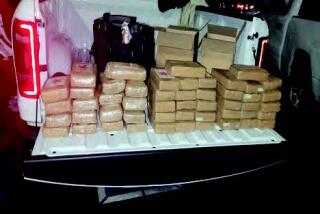Illegal Drug Profits Tied to Bankers : Court Papers Allege Laundering Network in Puerto Rico
- Share via
SAN JUAN, Puerto Rico — This island has long been a favorite of American corporations, its kindly tax laws a lure to the profit-minded.
But now Puerto Rico seems to have become a haven for another type of businessman as well. Drug traffickers, searching for ways to launder millions of dollars, apparently have been welcomed by obliging bankers at several friendly savings and loan institutions.
On Friday, affidavits were filed here in federal court relating to the arrests Thursday of 17 men, including 13 current or former bank officials. The documents not only describe a network of allegedly corrupt bankers but also tell of chicanery involving the common man’s favorite way to invest: the lottery.
“You simply state, ‘I hit the lottery,’ ” Hector Rey Balaguer is quoted as coaching an undercover Internal Revenue Service agent who was pretending to be a drug dealer.
Rey is described as the ringleader of several acaparadores , people who seek out lottery winners and repurchase their winning tickets at a price higher than the prize. The acaparadores then earn a 10% to 13% commission reselling the tickets to drug traffickers--or other tax evaders--who need a good explanation for acquiring a large sum of money.
U.S. law, which applies to the commonwealth of Puerto Rico, requires financial institutions to report currency transactions over $10,000. Drug dealers need a “cover” for their illicit profits.
$1-Million Prize
On this island, where the lottery has been a mania since 1814, the weekly game offers a first prize of $125,000. Special holiday lotteries award a $1-million prize.
The more conventional way to launder drug money, however, is through a cooperative banker who neglects to file Form 4789, the currency transaction report.
Suspicions that bank laws were being ignored prompted a federal task force known as Operation Greenback to begin an investigation here. During the last 18 months, undercover agents have approached bankers about laundering schemes. Thursday, more than 200 federal officers made a coordinated raid on 10 banks.
Among those arrested was Guillermo Rivera Guerrero, a branch manager for Western Federal Savings Bank.
According to one affidavit, he blithely advised an undercover agent about the best way to choose a phony name and Social Security number to place on certificates of deposit.
“He cautioned me to sign the card so as not to resemble my own signature,” the affidavit quoted the agent as saying.
Although the customary fee for money laundering was 3%, Rivera allegedly allowed his customer to leave the amount to his own discretion.
“Rivera claimed that he was not just doing this for the money but for the growth of the bank,” the agent said.
According to Mariano Mier, president of the local Savings and Loan League, there is great pressure on branch managers to increase deposits and transactions.
On one occasion, Rivera allegedly introduced the agent to a man who could handle larger sums, Raul Enrique Penagaricano Soler, a prominent banker and dapper civic leader known for his expensive vested suits and polka-dot silk ties.
Penagaricano, one of those arrested and charged Thursday, is president of Caribbean Federal, the third smallest of a dozen savings and loan institutions on the island.
Penagaricano, according to several affidavits, repeatedly exchanged certificates of deposit for supposed drug money. He would patiently chat with his customers in a conference room while underlings counted the cash.
‘A Real Shocker’
“His involvement is a real shocker,” Mier said. “I went to Jesuit school with him.”
Penagaricano is active in the Popular Democratic Party, which now controls the island’s government. He is also one of 16 directors of the Federal Home Loan Bank in New York, a unit of the U.S. regulatory agency for savings and loan institutions. The New York district includes New Jersey, Puerto Rico and the U.S. Virgin Islands.
“I’m reaching an age where very few things surprise me,” said Bryce Curry, president of the bank in New York. “But this surprised me.”
Penagaricano faces a maximum term of 30 years in prison and fines totaling $2.5 million.
“Things here were getting out of hand,” said Daniel Lopez Romo, the U.S. attorney in San Juan. “It was time to move in.
“But this isn’t it. I’m not saying all the banks involved have been identified. This is just chapter one in a big book.”
More to Read
Sign up for Essential California
The most important California stories and recommendations in your inbox every morning.
You may occasionally receive promotional content from the Los Angeles Times.













